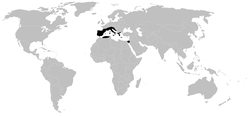Trogulidae
| Trogulidae | |
|---|---|
| Scientific classification | |
| Kingdom: | Animalia |
| Phylum: | Arthropoda |
| Class: | Arachnida |
| Order: | Opiliones |
| Suborder: | Dyspnoi |
| Superfamily: | Troguloidea |
| Family: |
Trogulidae Sundevall, 1833 |
| Genera | |
| Diversity | |
| 7 genera, c. 45 species | |
 |
|
| Approximate natural range of Trogulidae | |
The Trogulidae are a family of harvestmen with about 45 known species.
Members of this species have short legs and live in soil. They have dirt attached to their bodies, to escape predators. Their body length ranges from 2 to 22 mm. The body is in most genera somewhat flattened and leathery. Adults have a small hood, which hides their short chelicerae and pedipalps.
Members of this family occur in western and southern Europe, up to western North Africa and the Levant, the Caucasus and northern Iran. Trogulus tricarinatus, a predator of terrestrial snails, has been introduced to eastern North America.
The derivation of the name of the type genus, Trogulus, is not fully understood. The describer Latreille wrote that he named it because it looks like a monkshood. Perrier (1929) however derived the name from Ancient Greek trogein "gnawing", because of the rough, "gnawed-upon" appearance.
...
Wikipedia
